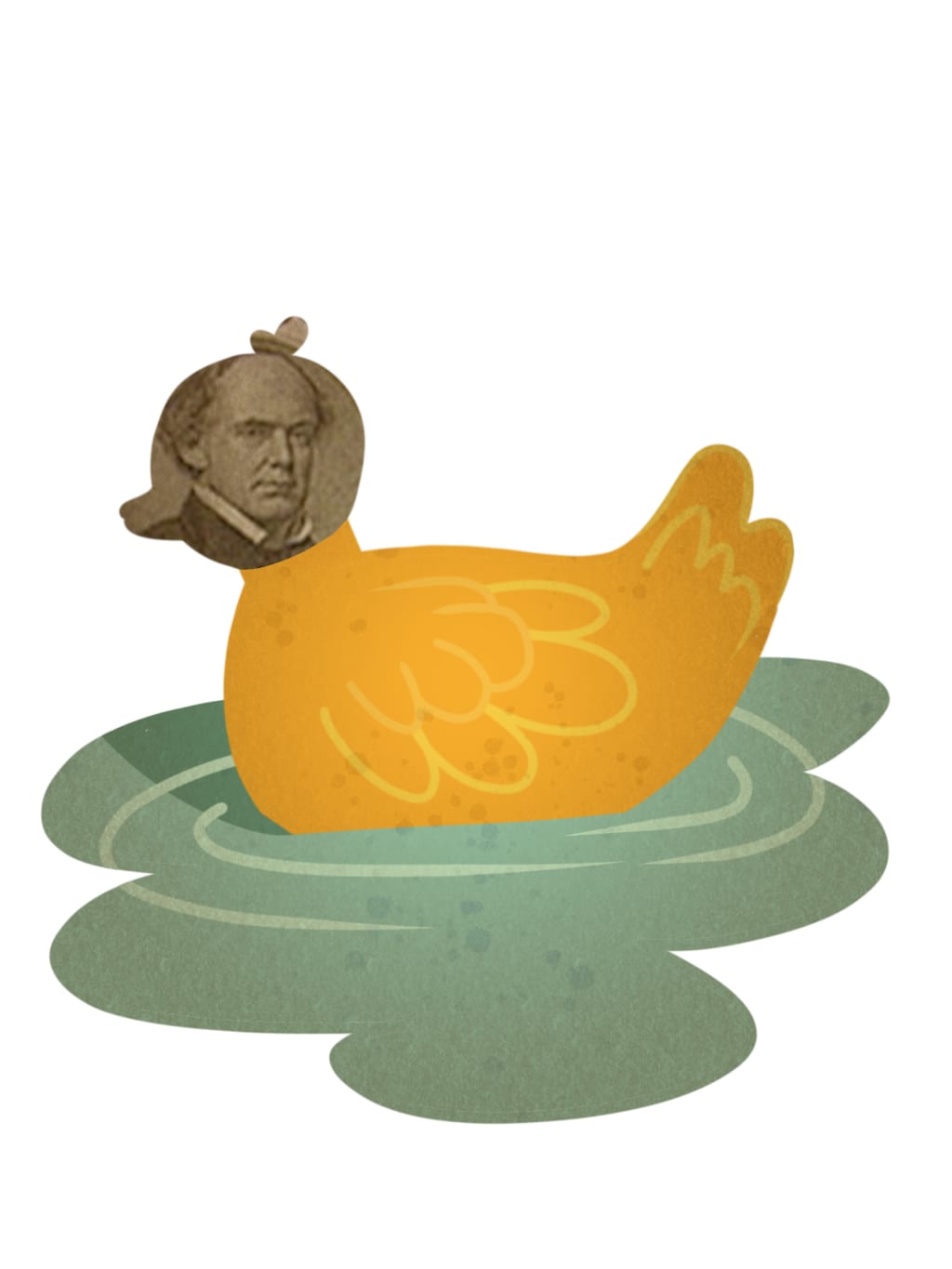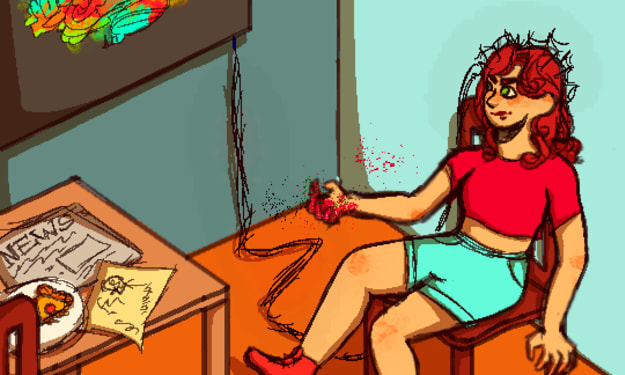Chasing Ducks
How to add intimidation to your bookshelf

Salmon P. Chase stared back at me. Smug.
Chase was President Lincoln’s Secretary of the Treasury. He was responsible for issuing the first federal paper currency, which helped the Union maintain its financial status during the Civil War. To boost his own presidential ambitions, he made sure it was his face on several denominations of bills, including the $1. Chase Bank takes its name from him, and his face was printed on the 1918 issuance of the $10,000 bill.
I was going through some odd drawers in our house when I stumbled upon two of the Chase $10,000 bills, tucked in an old edition of “The Infantile Sickness of ‘Leftism’ in Communism” by N. Lenin. Being something of a book collector, I appraised the book at poor condition and set it aside. While the book had a slightly mildewed cover with yellowed pages, the bills still looked relatively fresh.
I flipped one of the bills over and glanced at the “EMBARKATION OF THE PILGRIMS” on the other side. All of the pilgrims looked worried, like they anticipated coronavirus pandemics and other global calamities coming about as an indirect result of their extended foray across the Atlantic.
I figured the two bills were worth something, so I handled them carefully, doing everything but donning nitrile gloves as I placed them back in the Lenin book. I grabbed the Lenin book and an additional untitled little black book lying nearby and brought them to our dining room table to study further in better light.
We bought our house the previous year from the children of the owner, a woman who lived in the house for over sixty years. We didn’t know much about her, or her family. Aside from painting several of the rooms an unusual shade of red, all we knew about them is they gave us a market-based price for their house and they were cordial enough when we acquired the title.
I started reading through both of the books when I noticed the Lenin book was signed, in English, “To my bourgeoisie brother, N. Lenin†”. At first I didn’t notice the dagger symbol at the end of the autograph, but then I was intrigued by the name and looked closer. At the bottom of the page were some additional scribblings that I had initially dismissed as printing errors or ink smudges. I determined later they were written in Russian and, roughly, translated to: “I farted at your wedding. That wasn’t a duck. L”.
I carefully set the book down in wonder. Where did the previous owner get this book? The house was built in 1912, so it was possible that the previous owner didn’t know about the books in the drawers. In fairness to her, the drawers were in an odd location, built as something like a carpenter’s afterthought to fill space to the ceiling in a hallway.
The other book was a curiosity, to say the least. It was like a journal, but it had been passed around among three authors, writing in Russian, who signed their names using Russian lettering: “C” (or S), “T” (same in English), and “Л” (or L). No other identifying information was provided. However, the handwriting from “L” matched that in the footnote of the other book. My best guess is that the book was exchanged between the three friends periodically, with S contributing to the correspondence later than T and L. By today’s standards, the journal was like a handwritten e-mail thread but not as immediate, given the correspondence takes place over the course of a year.
While it’s entirely possible the correspondence was between Vladimir Lenin, Leon Trotsky, and Joseph Stalin, I can’t be sure. All of them were equally prolific in their lifetimes, and both Lenin and Trotsky were living in London at the time of Trotsky’s wedding to his second wife, Natalia. Given Stalin and Trotsky’s increasing animosity toward each other, coupled with Lenin’s increasing wariness toward Stalin, the hints of a sinister tone emerge as the thread unwinds.
What follows is a rough translation of their correspondence:
“October 20, 1920: I asked Natalia about her remembrances of our wedding day. She said it was lovely except for the stinky ducks. She then asked why we permitted you to bring your entourage of ducks to the ceremony to which I replied that ducks are cheaper than children. At that point Natalia nodded solemnly toward our collective disappointment, Sergei, who has yet to start his own revolution at the pathetic age of 12. Remember my telling you how I staged my first revolution at age 6? Remember? -T”
“November 16, 1920: Nadya didn’t want me to bring the ducks. However, she makes the most delectable cabbage rolls which, still to this day, grant me thunderous flatulence. I had been training the ducks to quack at the word, Menshevik, as a joke send-off to you and your lovely bride and your embrace of Martov’s lesser political ambitions at that time. However, I was disappointed that the word didn’t come up at your nuptials or anytime after. Determined as I was to justify to Nadya my bringing the ducks, I farted at your receiving line and pointed at the ducks. No one was the wiser. -L”
“December 5, 1921: He (or she) who smelt it, dealt it, I always say. I can’t smell. I’ve eaten a lot of Nadya’s cabbage rolls. -S”
“January 17, 1921: The ducks weren’t nearly as bad as the penguins, according to Natalia. Where did you find those anyway? -T”
“January 28, 1921: At the time, Nadya and I were a little more than obsessed with the English Christmas Carol, “The Twelve Days of Christmas”. Remember how I also gave you the pear tree, two turtle doves, three French hens, four calling birds, and five golden rings? -L”
“February 12, 1921: Six penguins pooping? Is that part of the song? -T”
“March 3, 1921: It was supposed to be six geese a-laying, but I thought the penguins were so much more adorable than geese. Plus, I figured Sergei would like them. Besides that, S needed to unload them quickly after hustling down another member of the former Russian aristocracy. To make up for the penguins, I tucked a little something in with this copy of my latest book. -L”
“March 6, 1921: I ate the geese, with more of Nadya’s cabbage rolls. I also ate the partridge. Yum. -S”
“April 1, 1921: I learned the English Christmas Carol you mentioned. However, I was perplexed that you stopped with the penguins. What about the rest of the song? While Sergei loved the penguins, Natalia and I had mixed feelings about them as they looked bourgeoisie with their immaculate tuxedos. Plus, they ate ALL the fish in our backyard fish pond, including the Japanese koi. -T”
“April 25, 1921: I just figured it’d be easier to give you $20,000 American dollars rather than go through the Politburo for the remaining parts of the song. Besides, milkmaids are mean. Since implementing Communism, I don’t recognize anyone as a lord or a lady, and anyone claiming to be one automatically gets shaken down by S for their money. That’s how we came upon the two $10,000 bills. S found a bourgeoisie family that was about to embark on a new life in America. He persuaded them that a state-sponsored stay in Siberia would be much more to their liking and relieved them of their excess wealth, doubtless exploited over many years from the working underclass. -L”
“March 17, 1921: While I agree entirely with your assessment of the former aristocracy, I’m still left with money I can’t spend. How am I supposed to spend $20,000 American dollars in our country? How much is that worth in rubles? Is there any way we could send the penguins on a state-sponsored stay to Siberia? Sergei is starting to smell like them. It’s not pleasant, but it was not as unpleasant as the meeting of the 10th Party Congress. -T”
“April 2, 1921: $20,000 American dollars will get you 11,555 pairs of superior-quality Soviet galoshes. Good for any aspiring proletariat family and good for helping to support state security and the secret police, which doesn’t exist. Wink. I will take care of the penguins. If you like, I can also take care of Sergei, and the rest of his family. Seems fitting after your recent defeat at the 10th Party Congress. Wink wink. -S”
“May 1, 1921: Happy May Day to all! Party on, comrades! -L”
Whether this correspondence is accurate is entirely up to historians. For my part, I took the $10,000 bills to an appraiser friend of mine and found them to be worth about $140,000 each. The book, while it is a first edition, is in poor enough condition that it doesn’t warrant further investigation. Suffice to say it now looks intimidating on my bookshelf. I also tried to research any connection of Trotsky to the woman who used to own this house and found none. I also tried to check the owner before her and found it to be more trouble than it was worth. However, Trotsky lived in New York from December of 1916 to March of 1917. While he was there, he may have made connections that led to both books manifesting in our house.
There’s a Russian tea house and a duck pond at the end of my block. Maybe I’ll ask there?
About the Creator
Anton Crane
St. Paul hack trying to find his own F. Scott Fitzgerald moment, but without the booze. Lives with wife, daughter, dog, and an unending passion for the written word.






Comments
There are no comments for this story
Be the first to respond and start the conversation.